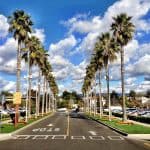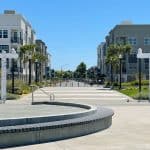Spirited Planning Board hearing reveals concerns over Draft Zoning amendments.
At its Monday, June 13 meeting, Alameda’s Planning Board held a public workshop to review and comment on the Draft Zoning Amendments needed to implement programs in the Draft Housing Element. The Housing Element is Alameda’s housing plan for 2023-2031. Required by State law, the Housing Element must provide for Alameda’s share of the regional housing need, referred to as the Regional Housing Needs Allocation (RHNA). Alameda’s share is 5,353 new housing units.
Background

State law requires the Housing Element to affirmatively further fair housing by removing zoning and regulatory barriers that would prevent the development of the 5,353 housing units during the 2023-2031 period. Under Assembly Bill 686, cities must accomplish this through “deliberate action to explicitly address, combat, and relieve disparities resulting from past and current patterns of segregation to foster more inclusive communities.”
In sum, the Housing Element must not only result in 5,353 new housing units. In addition, new housing must be distributed equitably throughout Alameda, and the Municipal Code must not create barriers that exclude or discriminate against particular housing or household types.
Public comment
Ten members of the public submitted comments on a range of topics. Karen Bey noted that twenty years ago, a study found that Alameda residents spent $200 million annually outside the City. Since then, the City has captured some of this retail leakage with new developments and improvements to existing shopping areas, so sales tax revenues have increased significantly. She expressed concern that some zoning amendments might reverse this positive trend and urged balancing new housing goals with the need for quality shopping.
The Alameda Architectural Preservation Society (AAPS) commented that the proposed upzoning is excessive, saying that the zoning amendments within all residential and historic commercial districts appear unnecessary to meet the RHNA and fair housing requirements.
AAPS further commented that reliance on bus lines as a basis for upzoning is unwise, arguing that AC Transit could easily change or eliminate bus routes. Planning Board Member Hansom Hom responded that major transit corridors are not going away, and the goal is to encourage housing along such transit routes.
Residents of the North Park Street District spoke against proposed increases in density and building heights in this area, arguing that the zone doesn’t have the street parking to support such increases.
McKay Avenue facility controversy continues

Numerous speakers commented on the controversial application to the State Office of Historic Preservation to put the McKay Avenue facility (across from Crab Cove) on the National Register of Historic Places. The Wellness Campus would provide 100 housing units for formerly homeless seniors. This housing would count toward RHNA requirements; without it, the City would have to build 100 units elsewhere. Edited 4:50 p.m. to remove reference to AAPS.
Planning, Building, and Transportation Director Andrew Thomas noted that if the application is successful, the Alameda Wellness Campus planned for the property would no longer be financially feasible. Past hearings have demonstrated that rehabilitation of the existing structures as affordable housing is too costly. Consequently, the Alameda Historical Advisory Board approved removing the buildings.
Some speakers supported the application, arguing that historical preservation should not prevent the reuse of the buildings and that Wellness Campus proponents sold the project to voters on the premise of reuse, not demolishing the structures. Others argued that the only reason to apply for historical status at the state level was to stall or kill the Wellness Campus project. Following up on this premise, Alameda blogger Lauren Do has done extensive research into the history of the building to determine the veracity of the application. Edited 4:50 p.m. to remove reference to AAPS.
What’s next
The City has submitted the Draft Housing Element to the State for review by the Department of Housing and Community Development (HCD). In the meantime, staff continues working with the Planning Board and community to refine and improve the Draft Zoning Code Amendments.
Upon receipt of HCD’s comments in August, staff will amend the Housing Element and the Zoning Code Amendments, if necessary, to address identified inadequacies. The Planning Board will consider these amendments at public hearings in September/October.
In October, the Planning Board will hold a public hearing and transmit its final recommendations to the City Council. Then, in November or December, the City Council will hold public hearings and consider the adoption of the final Housing Element and Zoning Code Amendments.
The Draft Housing Element is available for review at www.alameda2040.org.
Contributing writer Karin K. Jensen covers boards and commissions for the Alameda Post. Contact her via [email protected]. Her writing is collected at https://linktr.ee/karinkjensen and https://alamedapost.com/karin-k-jensen.



